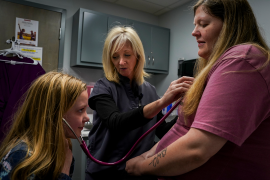A New York University study, published today in Health Affairs, found that older Medicare beneficiaries who lack prescription drug coverage may be less able than those with coverage to control serious health problems. Medicare does not cover most prescription drugs used on an outpatient basis and many elderly patients cannot afford to buy coverage from other sources. This study confirms widespread anecdotal reports that cost barriers keep the elderly from purchasing needed medications. In "Drug Coverage and Drug Purchases By Medicare Beneficiaries With Hypertension," Jan Blustein, M.D., of NYU's Robert F. Wagner Graduate School reveals that for older Medicare beneficiaries age 65 and older with hypertension ("high blood pressure"), those with drug coverage at any point during the year are more likely than those with no coverage throughout the year to purchase drugs that are needed to control this life-threatening disease. Drug coverage may be provided by Medicare HMOs, individual purchase of private insurance (also called Medigap), employer-sponsored health plans, state pharmaceutical assistance programs, or Medicaid. "Cost should not deter older Americans from obtaining critical medications," said Karen Davis, president of The Commonwealth Fund. "It makes sense, in economic and human terms, to consider ways to update Medicare to ensure that all beneficiaries get the advantages of modern health care." Blustein's research was supported by a grant from the Fund. Drug Coverage Matters Blustein's findings come from a nationwide survey of Medicare beneficiaries. All individuals included in the analysis were age 65 or older and lived in the community. All had hypertension — a common problem among older Americans that is a major cause of stroke, heart attack, heart failure, and kidney failure. She found that beneficiaries without coverage were 40 percent more likely than covered beneficiaries to fail to purchase any needed antihypertensive medications. Non-covered beneficiaries also faced higher out-of-pocket costs per pill for their drug purchases. They paid an average of 65 cents per tablet out-of-pocket, while those with coverage paid an average of 29 cents. Not only did a lack of drug coverage increase the likelihood that an older person would go without antihypertensives, but it also decreased the number of tablets purchased annually by those who did purchase antihypertensives. "When patients are financially squeezed they may "ration" their medications or forgo taking them entirely," said Blustein. "For an older person, this can mean the difference between living a healthy, independent life, and serious disability, or even death." Low-Income Beneficiaries Are Most At Risk Furthermore, the study found, some of most vulnerable older Americans with high blood pressure are the least likely to have coverage. Just half (56%) of those with incomes between 100 and 135% of the poverty level have drug coverage. In contrast, three-quarters (77%) of those with incomes over 400% of the poverty level have coverage. "Antihypertensive medications are essential: they save lives and decrease disability," noted Blustein. "The study findings underscore the extent to which America's current system of drug financing burdens many of those who are least able to bear the cost of potentially life-saving medications."


